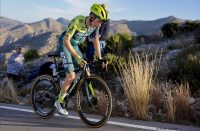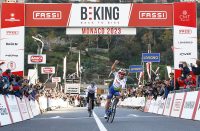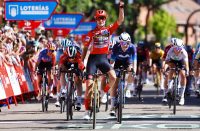Frustrated with your racing goals? Imagine what it’s like trying to compete when you have cerebral palsy. Kristin Brown is doing just that. She’s amazing.
At age 31 she discovered cycling, and now 3 years later, and can’t wait to race. She’s barely tested her brand new bike and is already dreaming of the Olympics.
Kristin was born with cerebral palsy, characterized by extremely tight muscles and uncontrolled muscle spasms, rendering her hamstrings virtually useless, and the remainder of her muscles significantly weaker. Stretching and massage give some temporary relief, which is very short-lived, maybe a day or an hour. Botox injections and surgical cutting of the muscles are two other known treatments for symptoms, but are not guaranteed and often short lived.
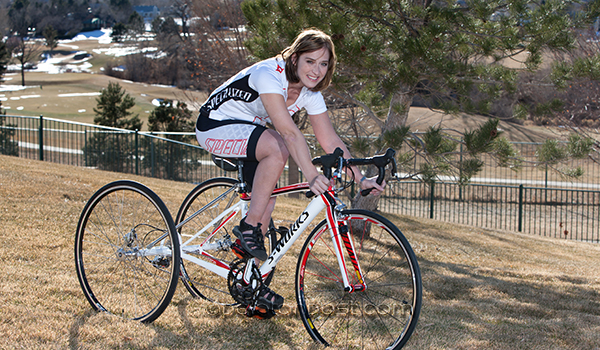
It was a chance meeting at the Fort Lauderdale airport that introduced her to disabled sports and paracycling. She was returning from a vacation and met Dawna Callahan, a staff member at the Olympic Training Center working with disabled athletes. Dawna convinced her to come try adaptive bikes, primarily handcycles, and 3 weeks later Kristin was visiting Colorado for the first, of what would become an every other weekend visit from Omaha, Nebraska to ride recreationally and try other adaptive sports. She got pretty good on a nature trail with the handcycle and was able ride 18 miles round-trip and this year used it to compete in the Marine Corp. Marathon. She was invited to Disabled Sports USA’s Adapt To Achieve Conference on paracycling in Chicago in October 2011 where she was introduced to different styles of competition bikes adapted for various disabilities, including the 3 wheeled trike category for those most disabled riders with use of their legs. She had to be closer to other disabled riders, so in April 2012 she left everything to relocate to Colorado.
After moving to Colorado, and at the encouragement of Steve Peace, US Paralympic cyclist, and US National Road Team coach and paracycling recruiter Rick Babbington, both veterans of the 2012 Olympic Games, she traded in handcycling for the trike category, so far as the only female preparing in that paracycling category. That meant buying a standard Specialized S-Works Amira carbon fiber bike, then waiting 8 months for Trykit in the UK to custom build the rear axle and components necessary to transform the standard two-wheeled bike to accommodate two back tires, per UCI paracycling regulations.
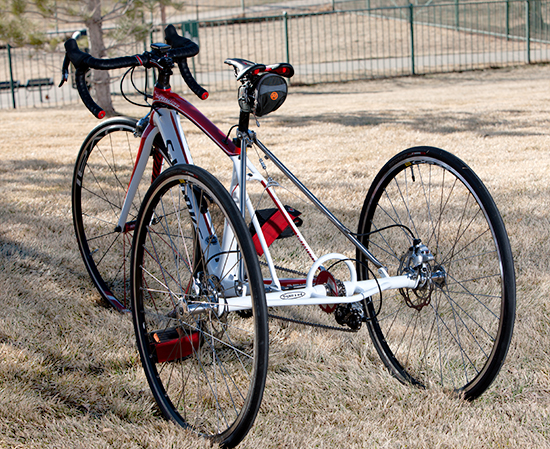
There are added expenses for a disabled cyclist. Besides the $2,700 axle, (which is cheaper and heavier than the titanium version for triple the cost), on the $8,000 bike, she has to buy duplicates of many things to accommodate the two back wheels, such as wind-trainers, wheel sets, brakes, etc. The hard travel bike case she’s going to need from Tri Sport has wheels so she can push it, while holding on for balance, but it is over $500.
Challenged Athletes Foundation provides annual grants up to $2,500 each year to hundreds of disabled athletes. They provided partial funding for her original handcycle, as well as The Hartford Ski Spectacular ski and snowboard camp last year. She’ll find out if she was chosen for reimbursement of her bike axle the first week of April. Having everything to date on no-interest financing for a few more months, every little bit counts. She’d love to find a bike shop that could give her a discount on equipment and labor even if they can’t become a financial sponsor. She’s invested the majority of costs in Specialized brand equipment, but so far has not had a response to mechanical or financial sponsorship.
She’s chomping at the bit to ride, but there’s one more hurdle. As a result of a surgery, her left leg is an inch shorter and faces outward, almost 45 degrees, resulting in her heel catching the crank arm as she comes down. Months have been spent talking to various bike shops in town. Most have no interest in thinking “outside the box”, or just no means to devote the time to finding a modification to accommodate the left pedal issues. Performance Bike Shop on Denver’s Colorado Blvd was the exemption, spending weeks and multiple pedal models and tools to address the length difference, and to some degree, the angle issue. The remaining angle issue can only be resolved completely with a custom made guard to prevent her heel from hitting the crank, while maintaining as much float as possible. Time is running out. Already too late to train for the Redlands Bicycle Classic April 4th, her hopes are set on the Para-Cycling Open April 20 & 21st in Greenville SC.
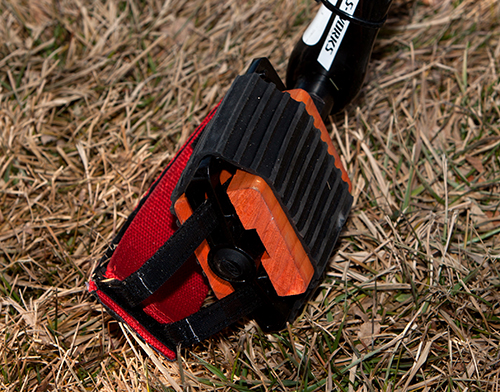
As the hunt for a reliable fabricator continues, she is focusing on next steps, finding routes to train on. Several factors need to be weighed. None of the bike lanes are wide enough for the trike, so which roads have the least amount of traffic to impede? Are the curb ramps wide enough to accommodate the back tires when she goes to cross a street? Are there too many hills or too sharp turns for a basic beginner? Do the surroundings provide people or structures to help remount/dismount the bike in the event of a fall? (Given the tightness of her muscles, she has limited hip range of motion and strength to left her leg over the bike, opting for a step, but hopefully with practice and her firm determination it’ll be a breeze in no time.
One thing that’s great is the support from fellow cyclists. Even though they’re competing, they’re really supportive of each other. They lend each other equipment, help with training tips, information on scheduled races, and offer lots of enthusiasm and moral support.
She’s so determined, I’m sure she’ll be racing on the trike by spring when the weather warms up and it’s cycling season.
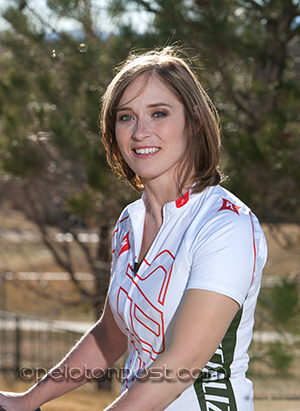
When she’s not cycling, she’s trying other sports. In 2010 she was the only girl on the Nebraska Barons wheelchair softball team, crowned the national champions in NYC. Since moving to Colorado, she’s taken up snowboarding in an effort to improve her balance and stability. She’s just completed her first 5-week session at Winter Park’s National Sports Center For The Disabled. The significant improvement in her balance and hip movement has her going down the hills, and signed up for another 5 weeks. She still struggles with endurance in her leg muscles, forcing her back to the bunny slope with the 3 year olds. It was fun. They promised not to crash into each other and all crashed together at the bottom! She’s learning to put more weight on her heels and her bad leg and her muscles are getting stronger. Off the slopes and bike, Kristin works as a nationally certified paralegal.
Update on Kristen: She’s competing in the ParaCycling Open in Greenville, SC on April 20-21 and was invited to the Olympic Training Center for the May training camp!

